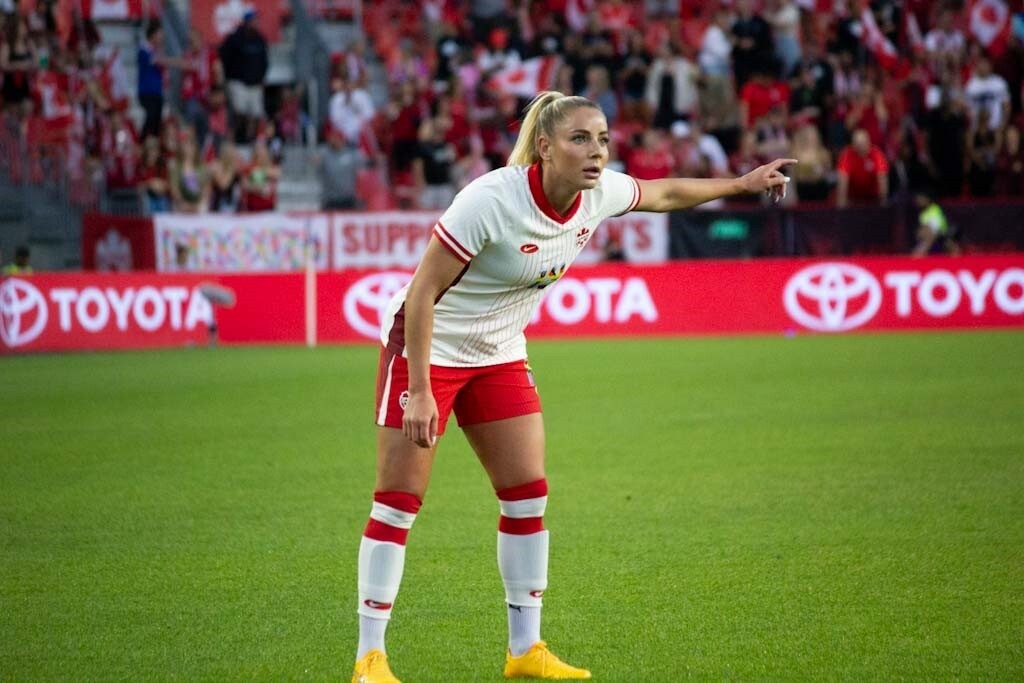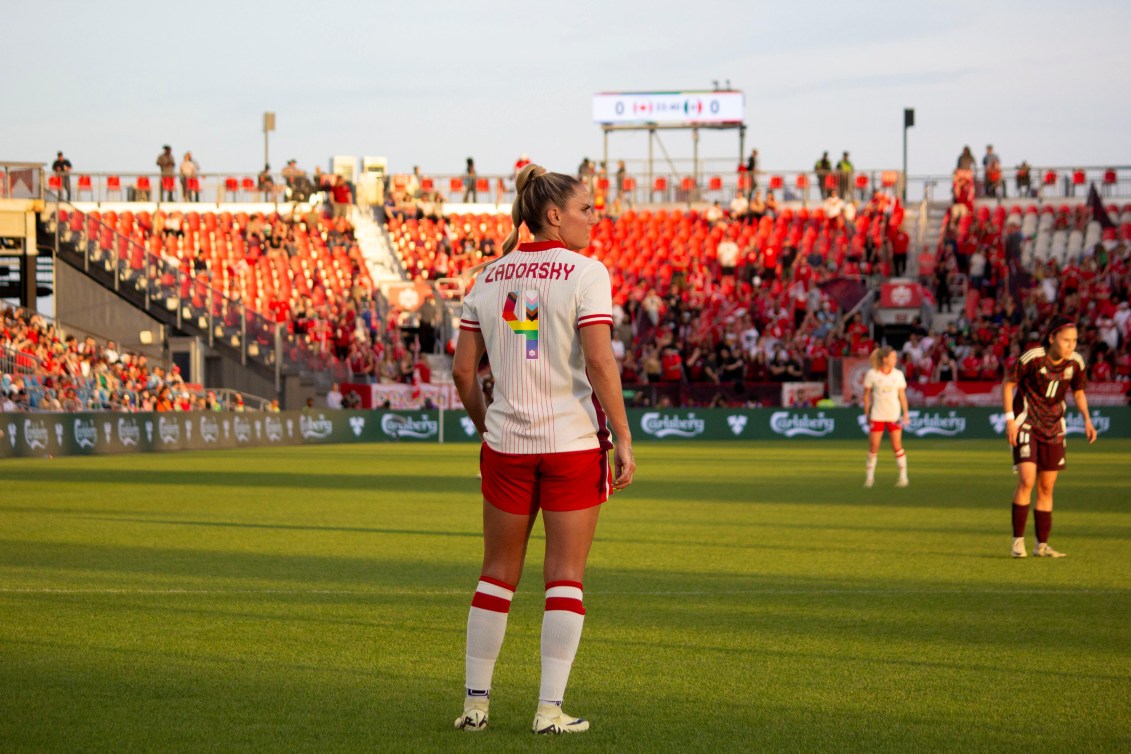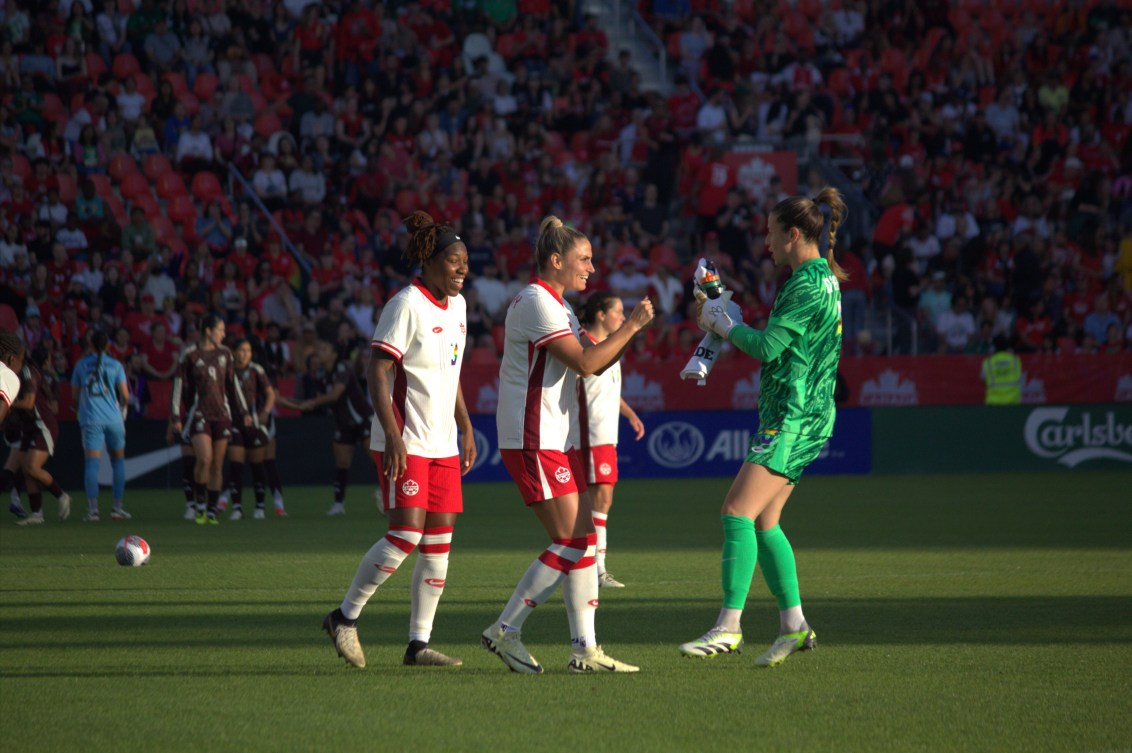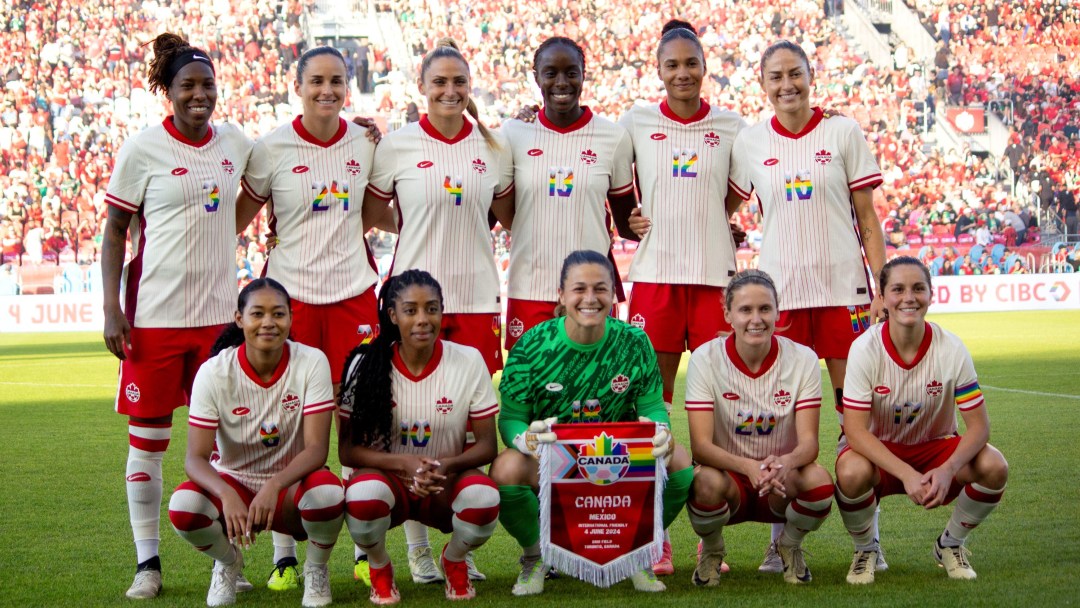Team Canada’s women’s soccer team leads with their values ahead of Paris 2024
Team Canada will enter Paris 2024 as the reigning Olympic gold medallists in women’s soccer. But after a difficult stretch post-Tokyo 2020 that saw the team take an early exit from the FIFA Women’s World Cup, they also enter the Olympic tournament this summer as somewhat underdogs.
Head coach Bev Priestman says she prefers it that way. Speaking to the media after a series of friendly matches against the Mexican national team in early June, Priestman was open about the team’s ups and downs in the years since the high of the last Olympic Games, which required her to take a hard look at herself and her team.
“I think we lost our way, right? We had an unbelievable 2021 and in 2022 we had some really good runs and then, for whatever reasons, we lost our way. And I lost my way in terms of my values and principles and being able to see the woods for the trees,” Priestman said frankly.
“The proud thing for me when you’re stood on the sidelines is when you see values out there of: Never say die. Being a good teammate. Respect. Humility. Working harder than any other team. These are all things that are in the DNA of this squad. And these values don’t just come from Christine Sinclair or Sophie Schmidt. There’s a whole generation before, like Diana Matheson, who put [these values] into this team and we absolutely can’t lose them.”

So what happened at the World Cup?
“We played it safe. I played it safe,” Priestman said. “Now we’re not doing that and it gets us places.”
The non-negotiables for Priestman en route to Paris 2024 are a re-emphasis on the team’s core values and identity. Leading with one’s values was a particularly important keystone message for players at the June 4 game in Toronto, which was not only the team’s second game in the summer send-off series, but also served as the team’s Pride celebration.
Team Canada took to the field wearing Pride jerseys and the sidelines were decked out with the colours of the Pride flag. For the players, celebrating Pride feels like a very natural extension of the team’s ultimate core value.
“Togetherness is something that we always talk about,” said rising star Simi Awujo after the match. And for Team Canada, togetherness implicates not just the players on the field, but the whole organization, and their fans.
“It’s such a good celebration and an important one,” said Shelina Zadorsky, who made her one hundredth appearance for Team Canada on June 4. “Our team, for lack of a better word, prides itself on being a really open and inclusive environment where we want everyone to come as themselves and express themselves with confidence. We are loved and accepted in this environment–and we want to extend that to our fans as well.”

“Anybody, staff or players, who step into our environment have the freedom to be who they are,” said Priestman. “And I think that’s really important for young people, for our fans, for our country to see and feel. Because I think we are role models, we’re an inspiration to young people. [Celebrating Pride] is something that’s close to our hearts.”
Priestman’s emphasis on values also places the onus on her to navigate the tricky process of selecting the Olympic team with as much transparency as possible.
Both the 2-0 win over Mexico in Montreal and the 1-1 draw in Toronto were the result of Priestman testing different lineups and partnerships. The depth of Team Canada’s roster and the extra effort from players determined to make the cut makes Priestman’s job a hard one. But again, she prefers it that way.
“I’ve always had the philosophy of just being honest,” she said. “[The players] know I care about them as people. They know their teammates care about them as people. And ultimately, there’s a group of players who are world class who are going to miss out [on Paris 2024]. Unfortunately, sometimes–I’ve said this before–it might not be the very best 18 players, it might be the very best squad. Ultimately, that’s the challenge that you have and we’re going to have to look people in the eye and have that conversation.”
If Priestman had her way, the roster would be greater than 18 for the Games, particularly due to the injury risks of the game, as well as the desire to give younger players major international experience ahead of World Cups.
The injury risks were on display during the June 4 match in Toronto. A particularly nasty bodycheck on Jordyn Huitema sent her flying onto the sidelines, where she remained for several minutes. Mexican head coach Pedro López apologized on behalf of his team in the post-game press conference. Karen Luna, the Mexican defender who executed the hit, received only a yellow card.
But Priestman says you can’t dwell on the aspects of the game that are out of your control, like officiating calls, and have to focus solely on what you can control.

“We’ve got learnings from every game. I’m absolutely just focused on the process. I need to continue to apply these learnings and when those tough decisions come you have to go with your gut and have the bravery to do it. I’ve learned that the hard way over the last 12 months and it was my X factor in Tokyo.”
Team Canada also heads into the Games buoyed by historic momentum within Canadian women’s sports. The last year has seen not only the first full season of the Professional Women’s Hockey League and the announcement of a Toronto WNBA team, but also the announcement of the Northern Super League (NSL), Canada’s first women’s professional soccer league.
“I think the culture around women’s sports in general in Canada is in a really great space and to be involved in it now is really special. And knowing that for future generations, it’s only going to get better and better. Canadians love women’s sports, so I think advocating for that and being a part of that is a huge honour,” Zadorsky said.
For his part, the Mexican head coach wished the best of luck to the new Canadian league, saying that approximately 85% of his own national team roster plays within the Mexican women’s pro league.
Priestman is eyeing the NSL as a huge boon to the development of women’s soccer in Canada.
“I can’t wait. I’m super, super excited,” said Priestman. “I think, you know, when you land back home with your gold medal in 2021, if there’s one thing you want in place, it’s that league.”
While the league won’t be operating ahead of Paris 2024, it is likely to have an impact on LA 2028.
Team Canada will compete in Group A during the upcoming Olympic tournament, facing France, Colombia and New Zealand during the group stage. Their first game will take place on Thursday, July 25 against New Zealand.
Team Canada enters the tournament as one of only three nations in the world to have won three medals in women’s soccer, having taken bronze at London 2012 and Rio 2016 prior to securing the gold medal at Tokyo 2020.


